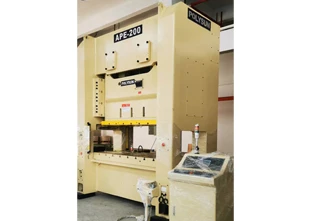Metal stamping machinery operates on the principle of deformation, where a flat metal sheet is shaped into a specific design or pattern by applying high pressure through a die or a stamp. The process can be carried out in a single stage or through a series of stages, depending on the complexity of the design.
The working of a metal stamping machine begins with feeding a metal sheet into the machine. The sheet is then positioned between the die and the punch, which is a tool that applies force to the metal. When the machine is activated, the punch moves downward and presses the metal sheet into the die, causing it to deform and take on the shape of the die.
The stamping process can include various operations such as punching, blanking, embossing, bending, flanging, and coining. The choice of operation depends on the desired end product.
Metal stamping machinery is widely used in various industries due to its ability to produce high volumes of identical parts quickly and cost-effectively. It is particularly popular in the automotive, aerospace, and electronics industries.
 English
English français
français Español
Español русский
русский português
português





